新版8年级上册第十单元B部分阅读课复习
- 格式:ppt
- 大小:224.50 KB
- 文档页数:11
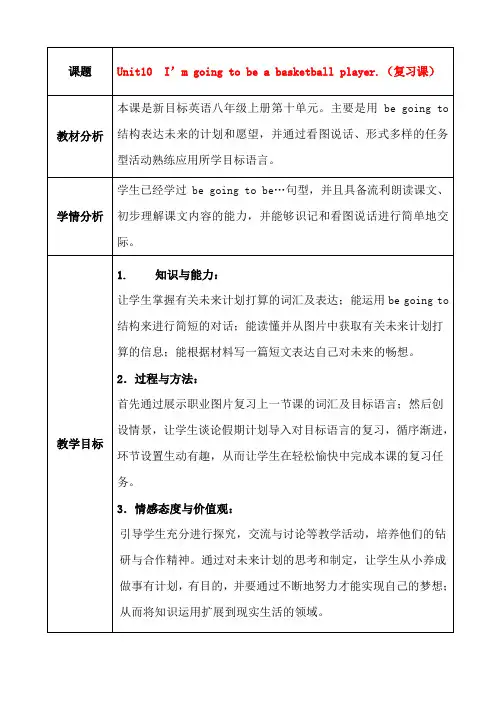
课题Unit10 I’m going to be a basketball player.(复习课)教材分析本课是新目标英语八年级上册第十单元。
主要是用be going to 结构表达未来的计划和愿望,并通过看图说话、形式多样的任务型活动熟练应用所学目标语言。
学情分析学生已经学过be going to be…句型,并且具备流利朗读课文、初步理解课文内容的能力,并能够识记和看图说话进行简单地交际。
教学目标1.知识与能力:让学生掌握有关未来计划打算的词汇及表达;能运用be going to 结构来进行简短的对话;能读懂并从图片中获取有关未来计划打算的信息;能根据材料写一篇短文表达自己对未来的畅想。
2.过程与方法:首先通过展示职业图片复习上一节课的词汇及目标语言;然后创设情景,让学生谈论假期计划导入对目标语言的复习,循序渐进,环节设置生动有趣,从而让学生在轻松愉快中完成本课的复习任务。
3.情感态度与价值观:引导学生充分进行探究,交流与讨论等教学活动,培养他们的钻研与合作精神。
通过对未来计划的思考和制定,让学生从小养成做事有计划,有目的,并要通过不断地努力才能实现自己的梦想;从而将知识运用扩展到现实生活的领域。
教学资源采用多媒体教学。
教学设计思路Reviewing by doing:采用教师创设复习情境-------学生合作探究-------巩固和拓展的教学模式实施过程:教学程序教师活动学生活动教学反思set up a situation Greet the class.First, I’ll divide thewhole class into fourgroups, Group 1,2,3,4.Let’s see which group willbe the first.Then, ask the students:---Did you watchyesterday’s basketballgame?--Do you like playingbasketball?---Who wants to be abasketball player?Ask other students about thequestionsThen, show pictures and letstudents say the words ofjobs.--Listen to theteacher carefullyand answer thequestions aboutyour dream jobs.---Look at thescreen and try tospeak out the words.Don’t need to putup your hands, juststand up and answer.这一教学环节就昨天刚结束的篮球赛为话题,引导学生思考并就老师提出的问题进行小组抢答,激发了学生们学习的潜能,创设了真实的语言环境,引导学生在情景中学语言。
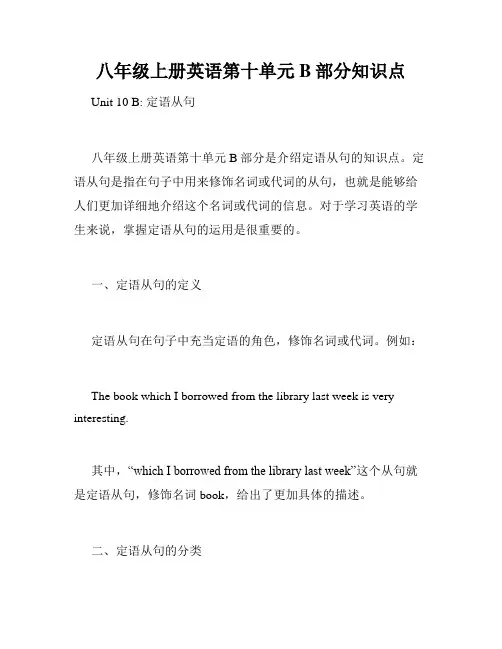
八年级上册英语第十单元B部分知识点Unit 10 B: 定语从句八年级上册英语第十单元B部分是介绍定语从句的知识点。
定语从句是指在句子中用来修饰名词或代词的从句,也就是能够给人们更加详细地介绍这个名词或代词的信息。
对于学习英语的学生来说,掌握定语从句的运用是很重要的。
一、定语从句的定义定语从句在句子中充当定语的角色,修饰名词或代词。
例如:The book which I borrowed from the library last week is very interesting.其中,“which I borrowed from the library last week”这个从句就是定语从句,修饰名词book,给出了更加具体的描述。
二、定语从句的分类1.关系代词引导的定语从句在定语从句中,关系代词who、whom、whose、which、that的使用是非常常见的。
关系代词引导的定语从句一般分为三类:(1)修饰人的定语从句,一般使用who或whom引导,who 用作主语,whom用作宾语。
例如:The boy who is talking with Lily is my brother.The girl whom you met yesterday is a new student.(2)修饰物的定语从句,一般使用which或that引导,可以用来代替任何物品。
例如:I like the book which/that you recommended.The house which/that has a red roof is mine.(3)修饰人或物的定语从句,使用whose引导,表示所属关系。
例如:The man whose car was stolen is very angry.The novel whose title is To Kill a Mockingbird is very famous.2.关系副词引导的定语从句关系副词when、where、why也可以引导定语从句。
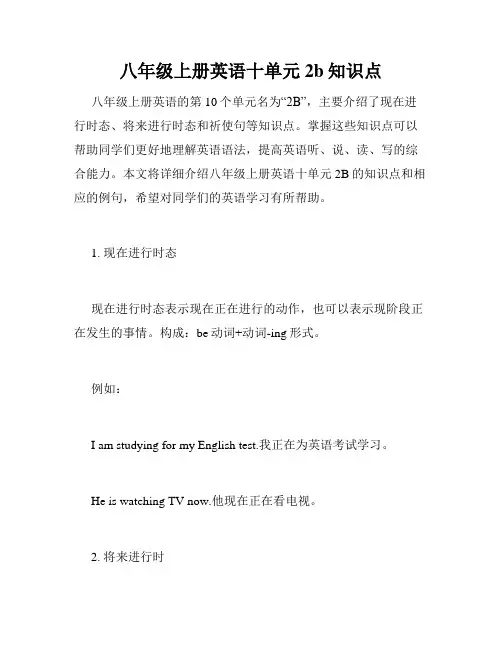
八年级上册英语十单元2b知识点八年级上册英语的第10个单元名为“2B”,主要介绍了现在进行时态、将来进行时态和祈使句等知识点。
掌握这些知识点可以帮助同学们更好地理解英语语法,提高英语听、说、读、写的综合能力。
本文将详细介绍八年级上册英语十单元2B的知识点和相应的例句,希望对同学们的英语学习有所帮助。
1. 现在进行时态现在进行时态表示现在正在进行的动作,也可以表示现阶段正在发生的事情。
构成:be动词+动词-ing形式。
例如:I am studying for my English test.我正在为英语考试学习。
He is watching TV now.他现在正在看电视。
2. 将来进行时将来进行时表示将来某个时间正在进行的动作。
构成:will + be动词+动词-ing形式。
例如:She will be studying Chinese at 8 pm tomorrow.明天晚上8点她将会在学习中文。
They will be visiting the museum next week.下周他们将会去博物馆参观。
3. 祈使句祈使句表示命令、请求、建议等,其中第二人称直接加动词原形就可以了。
例如:Open the door please.请打开门。
Sit down, please.请坐下。
4. 相关练习1)填空练习:A:What _____ you _____(do) now?B: I _____(watch) TV.A: What _____ you _____(watch)?B: I _____(watch) a movie.2)选择练习:( )1. My mother _____ cooking dinner in the kitchen now.A. isB. amC. areD. be( )2. They _____ the Great Wall next week.A. visitingB. will visitC. visitD. visited( )3. _____ me help you with your homework.A. LetB. LetsC. LettingD. To let( )4. _____ the window please. It's hot in the room. A. Close B. Closed C. Closing D. To close5)改错练习:1. What are you doing yesterday?()2. We will are going to the cinema next Saturday.()3. Please don't make noise.()4. Open your book in page three.()以上就是八年级上册英语十单元2B的知识点和练习,同学们可以通过不断的练习,掌握这些语法知识,提高自己的英语水平。
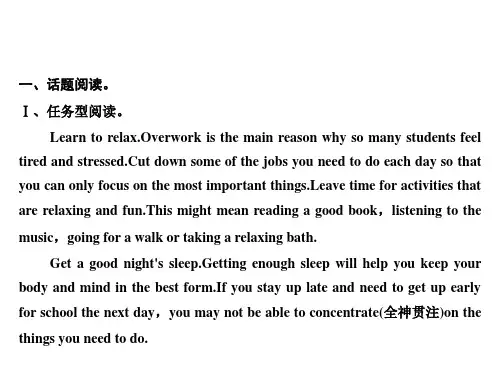
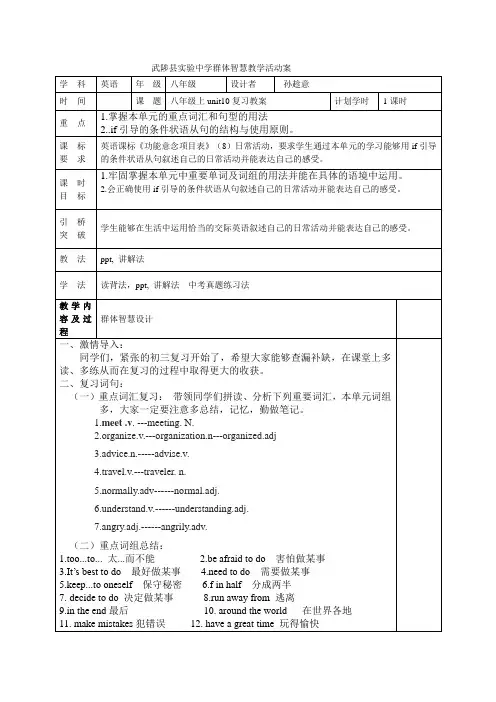
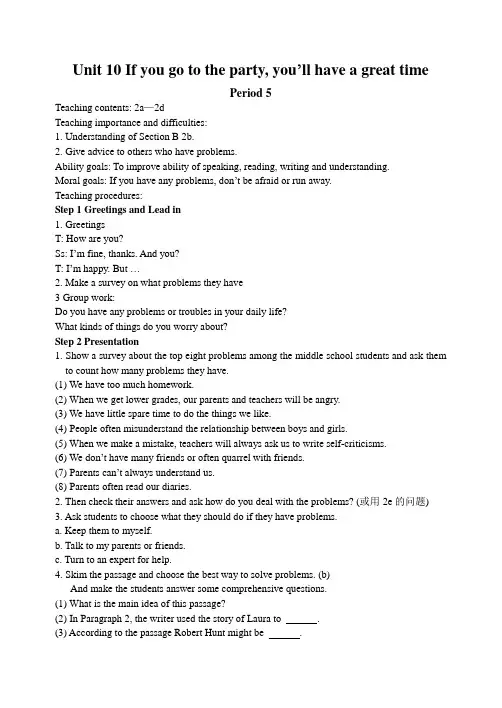
Unit 10 If you go to the party, you’ll have a great timePeriod 5Teaching contents: 2a—2dTeaching importance and difficulties:1. Understanding of Section B 2b.2. Give advice to others who have problems.Ability goals: To improve ability of speaking, reading, writing and understanding.Moral goals: If you have any problems, don’t be afraid or run away.Teaching procedures:Step 1 Greetings and Lead in1. GreetingsT: How are you?Ss: I’m fine, thanks. And you?T: I’m happy. But …2. Make a survey on what problems they have3 Group work:Do you have any problems or troubles in your daily life?What kinds of things do you worry about?Step 2 Presentation1. Show a survey about the top eight problems among the middle school students and ask them to count how many problems they have.(1) We have too much homework.(2) When we get lower grades, our parents and teachers will be angry.(3) We have little spare time to do the things we like.(4) People often misunderstand the relationship between boys and girls.(5) When we make a mistake, teachers will always ask us to write self-criticisms.(6) We don’t have many friends or often quarrel with friends.(7) Parents can’t always understand us.(8) Parents often read our diaries.2. Then check their answers and ask how do you deal with the problems? (或用2e的问题)3. Ask students to choose what they should do if they have problems.a. Keep them to myself.b. Talk to my parents or friends.c. Turn to an expert for help.4. Skim the passage and choose the best way to solve problems. (b)And make the students answer some comprehensive questions.(1) What is the main idea of this passage?(2) In Paragraph 2, the writer used the story of Laura to .(3) According to the passage Robert Hunt might be .5. 2c.Read the passage again and answer some more questions in detail.(1) What problems do students these days have?(2) For Laura, what helps a lot?(3) What did Laura’s parents do after she told them what happened?(4) In Robert’s opinion, what should we do best?Step 4 Finish 2dStep 5 SummaryIn our lifetime, we’ll meet different kinds of troubles. When troubles come, we can’t run away from them. We should face them bravely. After we solve our problems, we’ll find we learn a lot from them.Step 6 homeworkRead the passage 10 times. Write a short passage about your worries in life.。
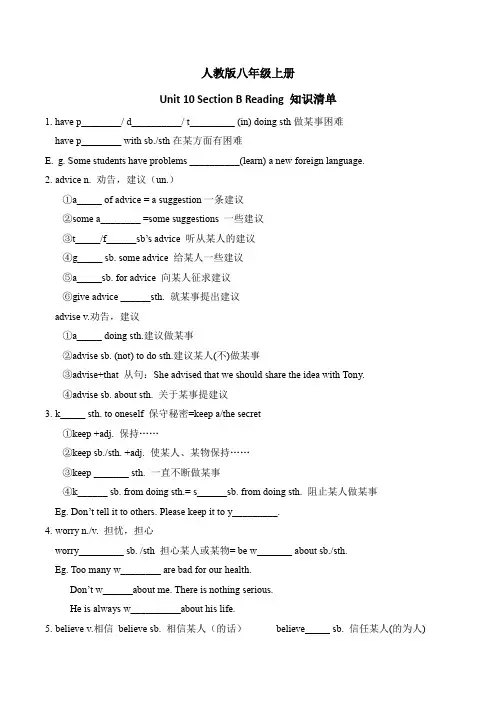
人教版八年级上册Unit 10 Section B Reading 知识清单1. have p________/ d__________/ t_________ (in) doing sth做某事困难have p________ with sb./sth在某方面有困难E.g. Some students have problems __________(learn) a new foreign language.2.advice n. 劝告,建议(un.)①a_____ of advice = a suggestion一条建议②some a________ =some suggestions 一些建议③t_____/f______sb’s advice 听从某人的建议④g_____ sb. some advice 给某人一些建议⑤a_____sb. for advice 向某人征求建议⑥give advice ______sth. 就某事提出建议advise v.劝告,建议①a_____ doing sth.建议做某事②advise sb. (not) to do sth.建议某人(不)做某事③advise+that 从句:She advised that we should share the idea with Tony.④advise sb. about sth. 关于某事提建议3.k_____ sth. to oneself 保守秘密=keep a/the secret①keep +adj. 保持……②keep sb./sth. +adj. 使某人、某物保持……③keep _______ sth. 一直不断做某事④k______ sb. from doing sth.= s______sb. from doing sth. 阻止某人做某事Eg. Don’t tell it to others. Please keep it to y_________.4.worry n./v. 担忧,担心worry_________ sb. /sth 担心某人或某物= be w_______ about sb./sth.Eg. Too many w________ are bad for our health.Don’t w______about me. There is nothing serious.He is always w__________about his life.5.believe v.相信believe sb. 相信某人(的话)believe_____ sb. 信任某人(的为人)trust sb. (not) to do sth. 相信某人(不)做某事trust sth. 相信某事Eg. I always t_______ you. So I believe in you.6.unless conj. 除非,如果不:本身就表示否定,相当于“if... not”, 其引导条件壮语从句时,与“if not 可以互换”I will go there u________it rains.=I will go there if it _________ rain.I will have no food u___________I have enough money.=If I __________(not have) enough money, I ___________(have) no food.7.angry adj. 生气的;发怒的----_________(n.)----___________(adv.)be angry __________ sb. 生某人的气/ be angry __________ +n./pron./doing sth. 因……生气Eg. I was a________with him for keeping me waiting for so long.He was a_________at my words. 他对我说的话感到生气。
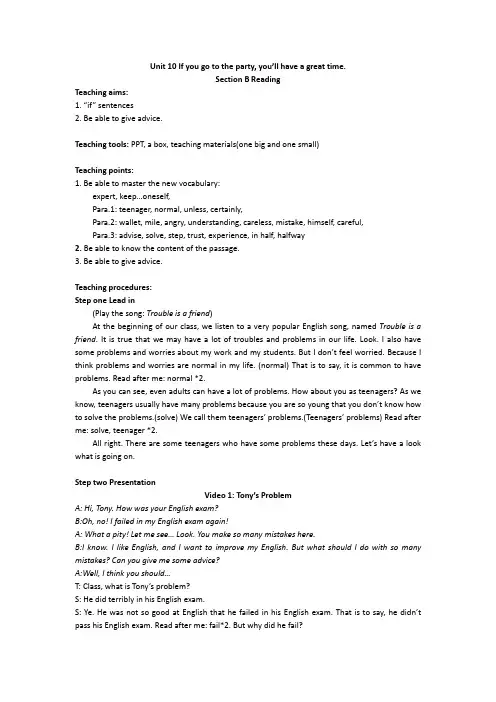
Unit 10 If you go to the party, you’ll have a great time.Section B ReadingTeaching aims:1. “if” sentences2. Be able to give advice.Teaching tools: PPT, a box, teaching materials(one big and one small)Teaching points:1. Be able to master the new vocabulary:expert, keep…oneself,Para.1: teenager, normal, unless, certainly,Para.2: wallet, mile, angry, understanding, careless, mistake, himself, careful,Para.3: advise, solve, step, trust, experience, in half, halfway2. Be able to know the content of the passage.3. Be able to give advice.Teaching procedures:Step one Lead in(Play the song: Trouble is a friend)At the beginning of our class, we listen to a very popular English song, named Trouble is a friend. It is true that we may have a lot of troubles and problems in our life. Look. I also have some problems and worries about my work and my students. But I don’t feel worried. Because I think problems and worries are normal in my life. (normal) That is to say, it is common to have problems. Read after me: normal *2.As you can see, even adults can have a lot of problems. How about you as teenagers? As we know, teenagers usually have many problems because you are so young that you don’t know how to solve the problems.(solve) We call them teenagers’ problems.(T eenagers’ problems) Read after me: solve, teenager *2.All right. There are some teenagers who have some problems these days. Let’s have a look what is going on.Step two PresentationVideo 1: Tony’s ProblemA: Hi, Tony. How was your English exam?B:Oh, no! I failed in my English exam again!A: What a pity! Let me see… Look. You make so many mistakes here.B:I know. I like English, and I want to improve my English. But what should I do with so many mistakes? Can you give me some advice?A:Well, I think you should…T: Class, what is Tony’s problem?S: He did terribly in his English exam.S: Ye. He was not so good at English that he failed in his English exam. That is to say, he didn’t pass his English exam. Read after me: fail*2. But why did he fail?S: Because he made many mistakes.T: That’s it, because he made many mistakes. (make mistakes) Read after me: make mistakes *2. You see: he loves English and he wants to improve his English. But what can he do with so many mistakes in English? Can you give him some advice?S1: He should read English every day.S2: He should listen to some English songs.S3: He should practice English every day.T: I agree with you. We know that practice makes perfect.Class, I think it is OK to make mistakes in learning English. Even I myself make some silly mistakes sometimes. It is very important for us to face the mistakes and problems. Just remember: Unless you try your best, your English will certainly become worse.(unless) That is to say, if you don’t try your best, it is for sure that your English will become worse. Read after me: unless*2.T: Look, this is Tony’s problem. What is it about?S: It’s about his study.T: Yes. It is about his schoolwork. (schoolwork) Now, l et’s go on. How about Alice?Video 2: Alice’s ProblemHi, everyone. I am Alice. Can you help me? I trust my best friend Mary very much. So I shared my secret with her. But she didn’t keep it to herself. I am very unhappy about that. I don’t want to fight with her because I don’t want to lose my best friend. What should I do?T: Class, what is her problem about?S: Friends.T: Very good. It’s about her friends. (Friends)T: What is her problem?S: Alice’s friend didn’t keep her secret.T: Tha t’s it. Alice has a best friend Mary. She trusted her very much, so Alice shared her secret with her. But Mary didn’t keep it to herself. (keep…to oneself) Read after me: keep sth. to oneself *2.T:Look, Alice is very unhappy. Can you help her? What should Alice do?S1: I think she should talk with Mary about it seriously.S2: I think she should write to Mary to tell her real feelings.T: Great. Now, Jerry is quite unset right now. Wha t’s wrong with him? Let’s check it out.Video 3: Jerry’ ProblemA: Hi, Jerry. You look unhappy. What’s wrong with you?B: (Sigh) Bad luck! I lost my wallet last week. Because I don’t have money, I have to walk 2 miles every day to school.A: Really?B: Yeah. But… I am afraid to tell my parents. I think they will be very angry. What should I do? A:That’s too bad. I think you should…T: Class, what is Jerry’s problem?S: He lost his wallet.T: Yes, he lost his wallet. Read after me: wallet*2.T: He didn’t have any money. How did he go to school these days?S: He had to walk to school every day.T: For how long?S: Two miles.T:That’s really a long way. Read after me: mile*2.T:But, did he tell his parents about it?S:No.T: Why?S:Because they may be very angry about Jerry.T:That’s right. Maybe his parents will be very angry. Just like this.T: So, for Jerry, he has some problems with his family. (Family) Can you help him? What should he do?S1:He should go to the lost and found.S2:He should talk with his best friends.T: That’s a good idea. I think he should be more careful next time. Don’t be so careless. Read after me: careless*2. Class, should Jerry tell his parents?S: Yes.T:I think so. I believe they will understand. Because our parents are always understanding. (understanding) Do you thinks so?Read after me: understanding*2.T: I think it is a good way for Jerry to ask his parents for help. Class, if you have a problem, who can you go to for help?S:I can go to my friends for help.T: Sounds good. You have someone you trust to talk to.S:I can go to my teacher for help.T: That’s a wonderful idea. Because teachers and parents have more experience than you. (experience) And don’t forget: they are always there for you, right? Read after me: experience*2. This group one by one.However, sometimes our problems may be too serious and difficult. At that time, we need to go to an expert for more help. (expert) Read after me: expert*2. An expert can give you a lot of practical advice. He or she is going to advise you to do something and advise you not to do something. That can be pretty helpful for you.In English, we say that sharing a problem is like cutting it in half. (in half) So you are halfway to solving a problem. Pay attention: be halfway to doing sth.(be halfway to) For example, you are halfway to making your dream come true by trying every day.Now, everyone, please look at the blackboard. Read after me.Step three ReadingT: And today our new friend Laura Mills meets a problem, too. What is it? And how is she going to solve her problem? Everyone, please open your books and turn to Page 77. (P77)1. Fast readingT:Let’s have a fast reading first. Can you find the main idea of this passage? I got three choices for you.a. If people have problems, they should get advice from an expert.b. If people have problems, they should talk to other people.c. If people have problems, they should try to keep them to themselves. (Together)T: Now I’d like you to look through this passage and choose the main idea. Please underline somekey sentences to support your idea. Ok?If you get the answer, please put your hands up. Who’d like to share your answer?S: b. If people have problems, they should talk to other people.T: That is correct. How do you know that? Could you please find some sentences to support your idea?S2: Paragraph three- In English, we say that sharing a problem is like cutting it in half. So you are halfway to solving a problem just by talking to someone about it.S2: Paragraph one-But I think talking to someone helps a lot. Unless we talk to someone, we’ll certainly feel worse.T: As you can see, when we want to find the main idea of a passage, which paragraph should we go to?S: The first paragraph and the last paragraph.T: Terrific. We can find the main idea of a passage very quickly by reading the first and the last paragraph or sometimes the first and the last sentence of a passage. Very good.2. Careful reading1) Paragraph 1Class, these days students often have a lot of worries and problems, just like Laura. Now le t’s read the first paragraph. And have a try to fill in the blanks on your paper. Here we go.(Para1/2/3) 2) Paragraph 2Laura thinks problems and worries are very normal in life and she also thinks it is helpful to talk with someone about her problem. So what was her problem before? Let’s read the second paragraph and try to answer the questions one to four.3) Paragraph 3Laura’s parents are so understanding. You see, Laura is very happy now and she will always remember to share her problem in the future. How brilliant! And Robert Hunt, an expert, feels the same way as Laura. Now le t’s read the third paragraph. What is Robert’s advice? Please find them.The advice from Robert is so nice and useful. Let’s read them together loudly. OK?3.ListenNow, let’s listen to the tape of the whole passage. If you like, you can read after it. Please pay much attention to the pronunciation. Here we go.4. SummaryLe t’s have a summary. There are three paragraphs in this passage. In the first paragraph, it tells that students have many different problems. (Students’ problems) Laura thinks problems are normal in life. But why? In the second paragraph, it shares her story. (Laura’s story) In the third paragraph, an expert Robert Hunt gives some advice about solving the problems.(Robert’s advice) Right?Step four ProductionT: All right! So this is about Laura. How about you? Class, do you have problems?S: Yes.T: What problems do you have? Are they about your schoolwork, friends, family, or something else? (…) Remember? Sharing a problem is like cutting it in half. (Sharing a problem is like cutting it in half.) Now, everyone, please get the small piece of paper and write down your problems. Ofcourse, you don’t have to write down your names. You have three minutes. Let’s go.(Count the time)Do you finish? Great. Class, please fold your piece of paper.Look. This is a magical box. I call it as Happy Box. Because it can solve your problems and make you happy. Now, the last student of each group, stand up. Please help me to get the pieces of paper in your group and put them in the box. Thank you.Now, let’s see how it works. First, please work in 4 to 6. Next, each group can choose 2 pieces from the box. Then, discuss with your partners and try to write down different possible advice for him or her. Finally, you are so welcome to help your secret friends by sharing your advice with all of us. This structure on your paper may help you. Get it? Great. Now, the leader of each group please come to the front and choose the paper.Let’s get to work.(Play the music and turn down the music)Time’s up. Now let’s help our secret friends. Who’d like to be the first one?Step five SummaryWonderful! Thank you for your good and helpful advice.(Play the music: Trouble is a friend)You see: We can solve our problems by facing them and sharing them. Just remember: trouble is a friend. Sharing a problem is like cutting it in half. So you are halfway to solving a problem. My dear class, I hope you can be happy every day and become better every day by being friends with your problems.OK. That’ s all for today. Thank you for listening. My dear class, goodbye!。
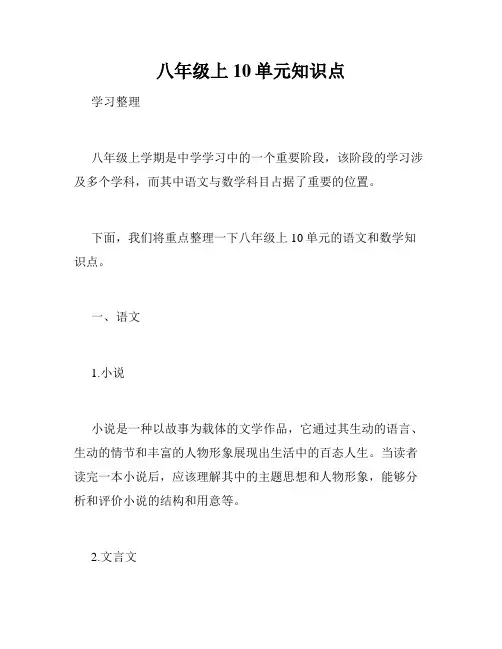
八年级上10单元知识点学习整理八年级上学期是中学学习中的一个重要阶段,该阶段的学习涉及多个学科,而其中语文与数学科目占据了重要的位置。
下面,我们将重点整理一下八年级上10单元的语文和数学知识点。
一、语文1.小说小说是一种以故事为载体的文学作品,它通过其生动的语言、生动的情节和丰富的人物形象展现出生活中的百态人生。
当读者读完一本小说后,应该理解其中的主题思想和人物形象,能够分析和评价小说的结构和用意等。
2.文言文文言文是一种古代汉语的写作形式,它是中国传统文化中的重要部分。
在学习中,需要掌握文言文的基本用法和特点,能够熟练阅读并理解古文的意义和作用。
3.文章文章是一种表达主题思想和观点的文学形式。
在学习中,需要掌握文章的结构和语言特点,能够从文章中理解作者的主题思想和观点,有一定的分析和判断能力。
4.修辞修辞是一种通过语言手法表现出思想和形象的技巧,它包括形象、比喻、对比、排比、夸张等多种手法。
在学习中,需要掌握修辞的用法和技巧,能够理解各类修辞手法的效果和作用。
二、数学1.数据的分析和应用数据分析和应用是数学学科中重要的学习内容之一,它要求学生能够运用图表、图像、表格等方式来处理问题,通过数据的整理与运算,最终得出结论和决策。
2.函数与图像的关系函数与图像的关系是数学学科中重要的内容之一,它要求学生理解和掌握函数和图像之间的基本关系,通过运用函数的基本概念和图像的特征来解决实际问题。
3.三角函数与图像的关系三角函数与图像的关系是数学学科中重要的内容之一,它要求学生掌握正弦、余弦、正切函数的基本概念和特征,并能够从图像中推导出三角函数的性质。
4.统计与概率统计与概率是数学学科中重要的内容之一,它要求学生掌握统计分布和概率的基本知识,并能够运用统计学和概率学进行实际问题的分析和解决。
通过对以上几个知识点的整理,我们可以看到八年级上学期语文和数学学科知识点的丰富性和重要性,希望同学们在学习中认真掌握,积极运用所学知识去解决实际问题,为未来的学习和工作打下坚实的基础。
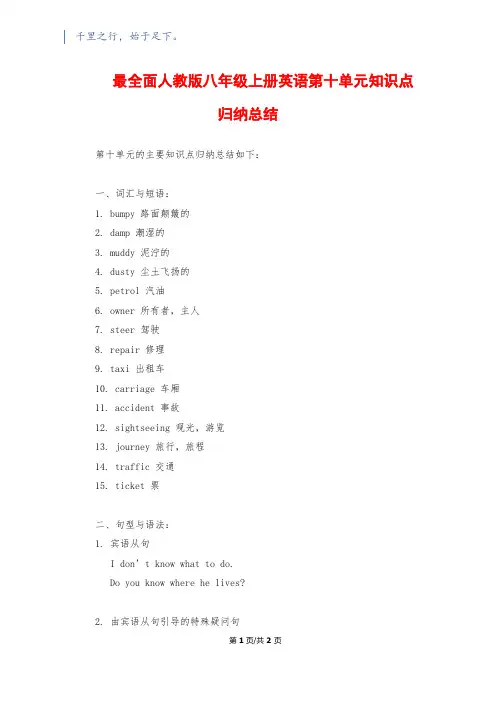
千里之行,始于足下。
最全面人教版八年级上册英语第十单元知识点归纳总结第十单元的主要知识点归纳总结如下:一、词汇与短语:1. bumpy 路面颠簸的2. damp 潮湿的3. muddy 泥泞的4. dusty 尘土飞扬的5. petrol 汽油6. owner 所有者,主人7. steer 驾驶8. repair 修理9. taxi 出租车10. carriage 车厢11. accident 事故12. sightseeing 观光,游览13. journey 旅行,旅程14. traffic 交通15. ticket 票二、句型与语法:1. 宾语从句I don’t know what to do.Do you know where he lives?2. 由宾语从句引导的特殊疑问句第1页/共2页锲而不舍,金石可镂。
Can you tell me what the weather is like?Do you know how to spell this word?3. 现在分词作状语Feeling bored, she decided to watch TV.The girl sat down, crying.4. “too…to…”句型The film was too scary to watch.It was too hot to go out.5. 祈使句和祈使句的回答Open the door, please.Don’t go there, will you?三、阅读技巧:1. 阅读并理解不明词汇的上下文含义。
2. 理解作者的意图和观点。
3. 根据文章的结构和提示理解文章的主题和段落大意。
4. 掌握阅读技巧,如认真审题、先读题后答题、根据文章的提示寻找答案等。
四、听力技巧:1. 首先,仔细倾听录音,抓住关键信息。
2. 理解主题意图和关系。
3. 需要辨别不同人的声音,如说话人的年龄、性别和身份。
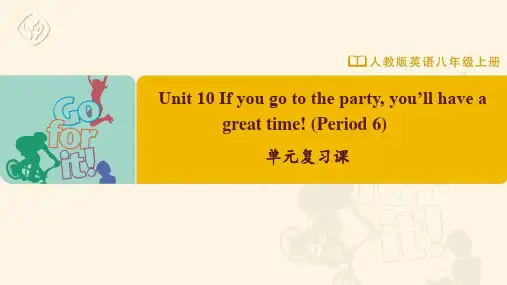
八年级上册英语书第十单元2b知识点在八年级上册英语书的第十单元2b中,主要介绍了一些基础的语法知识,包括情态动词、倒装句等。
这些知识点的掌握对于学生来说非常重要,因为它们不仅可以帮助学生更好地理解英语语法,还可以提高学生的英语口语和阅读能力。
以下是对这些知识点的详细介绍。
1. 情态动词情态动词是英语语法中的重要部分。
它可以用来表示说话者的态度、意图、推测和建议等。
常用的情态动词包括:can、could、may、might、will、would、shall、should、must等。
情态动词不像其他动词那样有时态的变化,而是与其他动词一起构成谓语。
例如,“She can swim”中的“can”就是情态动词。
2. 倒装句倒装句是英语语法中的一个很有趣的部分。
它通常用于表示强调或者词序颠倒的情况。
在倒装句中,主语和谓语的位置发生了颠倒。
例如,“On the table sits a book”中,主语“a book”在谓语“sits”之后,构成了倒装句。
此外,当表示否定或者疑问的时候,也需要使用倒装句。
例如,“Not only did she study hard, but she also got good grades”和“Did he finish his homework?”都是倒装句的情况。
在学习这些知识点的时候,我们需要注意以下几点:1. 了解语法规则在学习情态动词和倒装句的时候,我们需要深入理解它们的语法规则。
这样可以帮助我们更好地应用它们,并在口语和写作中熟练使用。
2. 多练习在学习语法知识的时候,多练习是非常重要的。
通过不断地练习,我们可以加深对这些知识点的理解,并更快地记忆它们。
3. 注意细节在使用情态动词和倒装句的时候,我们需要特别注意一些细节。
例如,在使用情态动词时,需要注意其与动词原形之间的区别。
而在倒装句的情况下,则需要注意主语和谓语的位置是否发生了颠倒。
总之,在八年级上册英语书的第十单元2b中,情态动词和倒装句是非常重要的语法知识点。
八年级上册十单元知识点八年级上册共有十单元,每个单元涉及的知识点都是非常重要的。
下面将逐一介绍这些单元的主要知识点。
第一单元:词汇训练这个单元的主要内容是学习一些基本的英语单词,如数字、颜色、家庭成员等,语言基础非常重要,这是英语学习的基础。
第二单元:语法单元在这个单元中,我们将学习一些基础语法如一般现在时与动词,以及一些介词和连词的用法。
这些语法知识是连接句子并使其流畅的重要工具。
第三单元:语音单元这个单元的主要内容是发音,重点是元音及其音标的学习。
清晰的发音让人们更好地理解你的话,故正确的发音对于学生来说非常重要。
第四单元:阅读单元在这个单元中,我们将学习如何阅读英语文章,就如何理解同时还要增强词汇量,包括快速阅读,了解主题,并根据上下文推断词汇,这些都是这个单元涉及的内容。
第五单元:听力单元在这个单元中,我们将学习如何听懂英语,通过听力训练,我们能够更好地理解英语,也能够更好地发音。
第六单元:写作单元在这个单元中,我们将学习如何写英语文章,学习如何使用词汇,如何正确地使用语法,让我们的文章更加流畅。
第七单元:口语单元在这个单元中,我们将学习如何说英语,表达自己的意思。
口语是基础,也是最容易被忽略的技能。
第八单元:文化单元在这个单元中,我们将学习一些和英语相关的文化知识,如文化差异、风俗习惯等。
通过学习英语文化,我们能够更好地了解和欣赏英语这门语言和它内在的魅力。
第九单元:任务单元该单元的重点是通过小组或团队完成任务,让学生能够在合作中提高自己的英语技能。
第十单元:复习单元在这个单元中,我们将总结前九个单元的知识点,通过复习来巩固已学的知识。
这将是一个非常重要的阶段,与前面的单元同样重要。
以上就是八年级上册十单元的主要知识点,祝学生们能够早日掌握这些知识点,将来能够取得更好的成绩。
Unit 10 If you go to the party, you'll have a great time!一、词汇与短语● 重点单词A部分1.meeting n. 会议;集会;会面2.video n. 录像带;录像anize v. 组织;筹备4.chocolate n. 巧克力5.upset adj. 难过;失望;沮丧6.taxi n. 岀租汽车;的士7.advice n. 劝告;建议B部分1.travel v. & n. 旅行;游历2.agent n. 代理人;经纪人3.expert n. 专家4.teenager n. 青少年5.normal adj. 正常的;一般的6.unless conj. 除非;如果不7.certainly adv. 无疑;肯定;当然;行8.wallet n. 钱包e n. 英里10.angry adj. 发怒的;生气的11.understanding adj.善解人意的;体谅人的12.careless adj. 粗心的;不小心的13.mistake n. 错误;失误14.himself pron. 他自己15.careful adj. 小心的;精心的;慎重的16.advise v. 劝告;建议17.solve v. 解决;解答18.step n. 步;步骤19.trust v. 相信;信任20.experience n. 经验;经历21.halfway adj. & adv. 在中途;部分地做22.else adv. 别的;其他的● 重点短语A部分1.have a great/good/ wonderful time = have fun= enjoy oneself 过得愉快2.go to the party with sb.和某人一起去参加聚会3.tomorrow night 明天晚上4.have a class meeting 开班会5.a good time to.do sth. 做某事的好时机6.ask sb. to do sth. 要求某人做某事7.too……to…… 太……而不能……8.give sb. some advice 给某人一些建议B部分1.go to college 上大学2.make (a lot of) money 赚(许多)钱3.It's best (not) to do sth.最好(不)做某事4.have problems with/doing sth.在某方面/做某事有困难5.run away 逃避;逃跑6.keep …… to oneself 保守秘密7.the first step 第一步8.in half 分成两半9.solve a problem 解决问题10.be famous for 因……而出名● 重点句子A部分1.If you go to the party, you'll have a great time. 如果你去参加聚会,你会过得愉快。
新目标英语八年级上Unit 10同步阅读(含答案)Unit 10 I’m going to be a basketball player.1Read the passage about Terra’s holiday plan and then fill in the chart. (读短文,填表格。
) “Next Tuesday is going to be a holiday,” says the teacher. “I w ant you to tell me what you areg oing to do, Terra.”“I’m going to the movie theatre to see a movie for that evening,” says Terra.“It’s a comedy about a fat professor. My classmates say it’s really funny.”“Anything else you are going to do?” the teacher asks.“Of course I’m going to do my lessons. I’m going to study math and physics in the morning.”“Do you like them?” The teacher wants to know.“They are not easy for me. But I’m interesting in them. I’m going to do my best at them. I think this term I can do better than last term.”“What are you going to do in the afternoon?” asks the teacher.“After lunch, I’m going to play basketball with some classmates. Next month, we are going to have a match with Class One.”Terra’s plan for holiday:2Read the passage and write True or False before each statement. (读短文,判断对错。